As the power conference portion of the fall college football season gets underway this weekend — amid a few postponements — it’s hard not to feel conflicted.
On one hand, it appears likely that we’re probably going to be embarking on a national title race without two of the five power conferences. (There could still be some surprises in that regard, but for now, we’re going to assume the Big Ten and Pac-12 get started too late for inclusion.) That stinks for any number of reasons — we don’t get Trevor Lawrence-Justin Fields II, we have to start arguing about asterisks soon, and this is all one constant, daily reminder about how college football’s siloed leaders couldn’t even work together during a pandemic. (And how there was no one in a position to force them to work together.)
On the other hand, that makes this race weird and exciting, doesn’t it? An unbeaten AAC champion is never going to have a better chance at making the field of four. Same for second-tier Power 5 (well, Power 3) teams like North Carolina and Iowa State. And if you squint really hard, you can talk yourself into next weekend’s BYU-Army game having national title implications.
(Don’t scoff at that yet. Let me have this.)
It also helps to assure that we don’t have nearly as straightforward a CFP race as we did last year. The odds of oddity are at least a little bit higher.
Who’s No. 4?
Let’s lean into that oddity for a moment. Let’s assume the most straightforward possible result this fall — that Alabama, Clemson and Oklahoma win their respective conferences, finish with zero or one loss each, and make their sixth, sixth and fifth CFP appearances, respectively. Who gets the fourth spot? Here are the 10 or so most likely teams in my eye.
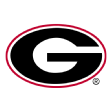
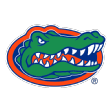
1. and 2. Georgia and Florida
Preseason rankings (among fall teams only): Georgia No. 3 (AP, SP+); Florida No. 6 (AP), No. 4 (SP+)
Likely losses (games SP+ projects as a loss by more than 7.5 points): None
Relative tossups (games projected within 7.5 points): For Georgia, it’s Oct. 3 vs. Auburn (projected margin of +5.9), Oct. 17 at Alabama (-5.2), Nov. 7 vs. Florida (+1.1). For Florida, it’s Oct. 10 at Texas A&M (+3.0), Oct. 17 vs. LSU (+6.4) and Nov. 7 vs. Georgia.
I can talk myself into chaos all I want, but chaos will require both Georgia and Florida to drop a close game or two in the regular season, then maybe get handled pretty well by Alabama in the conference title game. If the Dawgs or Gators roll to 10-0 or maybe 9-1, this exercise is mostly moot.
(We’ll talk more about these two below.)
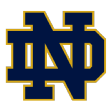
3. Notre Dame
Preseason rankings: No. 7 (AP), No. 6 (SP+)
Likely losses: None
Relative tossups: Nov. 7 vs. Clemson (-4.5), Nov. 27 at North Carolina (+4.2).
Brain Kelly’s Fighting Irish were, besides maybe Georgia Tech, the only team that saw its schedule get easier when moving to a larger set of conference games. They return an experienced quarterback in Ian Book, and while their skill corps gets a refresh, they should have the best non-Clemson line play in the ACC. If they handle key home games against FSU and Louisville and split the two tossups above, they’re in tremendous shape heading into the ACC title game.

4. Texas
Preseason rankings: No. 10 (AP, SP+)
Likely losses: None
Relative tossups: Oct. 10 vs. Oklahoma (-5.6), Oct. 24 vs. Baylor (+6.8), Oct. 31 at Oklahoma State (+2.8), Nov. 28 vs. Iowa State (+6.7)
On one hand, Tom Herman’s teams tend to play quite well as underdogs and could take control of the conference by beating OU in Dallas. On the other hand, they’re often mediocre as favorites and could easily slip up elsewhere. Regardless, this is a much deeper and more experienced team than the one that failed to live up to hype last year. They’ve got a chance to make a run.
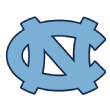
5. North Carolina
Preseason rankings: No. 12 (AP), No. 11 (SP+)
Likely losses: None
Relative tossups: Oct. 17 at Florida State (+2.6), Nov. 27 vs. Notre Dame (-4.2), Dec. 5 at Miami (+1.4).
Yes, UNC. For a team like the Tar Heels — not recently dominant, probably getting a poll bump from a dominant bowl performance — SP+ is usually pretty good at screaming “WE’RE OVERREACTING HERE” and tapping the brakes on the hype. Instead, SP+ is all in. The Heels were genuinely awesome down the stretch, and the offense that surged to 25th in offensive SP+ returns almost everyone, including quarterback Sam Howell. Plus, they avoid Clemson in the regular season.

6. LSU
Preseason rankings: No. 5 (AP), No. 9 (SP+)
Likely losses: One (-9.6 vs. Alabama on Nov. 14)
Relative tossups: Oct. 17 at Florida (-6.4), Oct. 31 at Auburn (-2.6), Nov. 28 at Texas A&M (-2.4).
Consider this the SEC West runner-up placeholder. It could easily be Auburn or Texas A&M, but I’m going with the national champs for one reason: upside. Despite the incredible amount of talent that has left Baton Rouge in the past nine months, LSU’s best players are still better than most. The Tigers still have the best corner in the country in Derek Stingley Jr. They still have receiver Terrace Marshall Jr., tackle Glen Logan, safety JaCoby Stevens, etc. And while they could certainly slog out a 6-4 campaign, that upside gives them a chance at another big run.
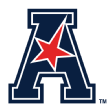
7. The winner of the Cincinnati/UCF/Memphis battle royale
Preseason rankings: Cincy (13 AP, 21 SP+); UCF (14 AP, 13 SP+); Memphis (17 AP & SP+)
Likely losses: None
Relative tossups: All three head-to-head matchups are tossups: UCF is favored by 0.6 at Memphis on Oct. 17, Memphis is favored by 2.0 at Cincinnati on Oct. 31, UCF is favored by 5.6 vs. Cincinnati on Nov. 21. Plus, Cincinnati has an Oct. 24 trip to SMU (+5.5). But the head-to-head matchups will tell the tale.
I’m lumping them all together, and my hope is that one of these three sweeps the head-to-heads and finishes unbeaten. The AAC is, on average, as close or closer to P5 conferences than it is to the rest of the G5. It will never have a better shot to get its champion into the field. But we can assume that this won’t happen unless a team finishes with zero losses.
Which one is most likely to get to that point? Both SP+ and FPI like UCF’s odds the most — FPI, in fact, gives Josh Heupel’s Knights a 20% chance of winning out.
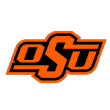
8. Oklahoma State
Preseason rankings: No. 11 (AP), No. 16 (SP+)
Likely losses: One (-10.4 at Oklahoma on Nov. 21)
Relative tossups: Oct. 17 at Baylor (+1.0), Oct. 24 vs. Iowa State (+2.8), Oct. 31 vs. Texas (-2.8), Dec. 5 at TCU (+4.8).
Your No. 3 Big 12 team placeholder. One can easily make a case for a high-continuity Iowa State squad, but the numbers like the Pokes slightly more, and as with LSU above, you can’t deny the raw upside. Mike Gundy’s team has some serious questions in the trenches: the Pokes were pushovers against the run and have to improve dramatically, and on the offensive line, four of last year’s top five are gone. (Adding WVU transfer guard Josh Sills helps a bit in that regard.) But they also have Chuba Hubbard, Tylan Wallace and high-ceiling QB Spencer Sanders, plus linebacker Amen Ogbongbemiga and the meanest, most physical set of safeties in the Big 12.
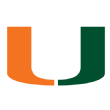
9. Miami
Preseason rankings: No. 19 (AP), No. 15 (SP+)
Likely losses: One (-14.0 at Clemson on Oct. 10)
Relative tossups: Sept. 19 at Louisville (+4.6), Sept. 26 vs. Florida State (+2.2), Oct. 17 vs. Pitt (+6.5), Nov. 14 at Virginia Tech (+2.6), Dec. 5 vs. UNC (-1.4)
Your No. 4 ACC team placeholder, and once again I’m riding with upside. A Miami team that continues to play strong, attacking defense and surges offensively with new additions D’Eriq King (quarterback) and Rhett Lashlee (offensive coordinator)? That’s an ACC contender. The defense has some holes to fill in the front seven, and it’s unfair to assume said offensive surge, especially considering how often we play the “Miami’s back …. NOW. No? OK … what aboooouuuut … NOW?” game. But we know what King can do, and we know what Miami’s defense usually does, and that combination looked pretty tantalizing in Thursday night’s win over UAB.

10. BYU
Preseason rankings: Unranked (AP), No. 35 (SP+)
Likely losses: None
Relative tossups: Oct. 16 vs. Houston (+2.6), Oct. 31 vs. WKU (+1.7)
A stretch? Maybe. But you’ve got to grant Kalani Sitake’s team this: The Cougars were absolutely terrifying on Monday night against an unprepared Navy team. Both lines were wheat threshers, and while quarterback Zach Wilson wasn’t asked to do much, he still posted a 200+ passer rating.
Better yet, the Cougars have about the easiest schedule known to mankind. Because they had to basically redraw their schedule from scratch in August after a run of cancellations, they’re playing the teams that were available for them to play. If they look the part, and the CFP committee is choosing between them and a bunch of two- or three-loss conference non-champions, do the Cougs get the benefit of the doubt? If they keep looking the way they did on Labor Day, they might have a case.
Cougars, Gators and stability rankings
BYU was indeed downright rude to its host on Monday night, winning by 52 and outrushing the option-loving Midshipmen by nearly 200 yards. After an offseason that featured less contact and altered practices and conditioning, BYU found an edge by simply mauling Navy at the line of scrimmage. The Cougars were really good at it, and we might see more teams trying the same thing.
Weak opponent aside, BYU had something else going for it: continuity.
One of the many theories we discussed this offseason was whether continuity might have more of an impact on teams than it normally does. With spring practices eliminated and practices altered, might there be an added bonus for a team that already knows itself, its culture and its coaches?
If so, here are some other teams that could benefit. Below is a list of FBS teams that (a) are playing this fall, (b) have a head coach entering at least his third season, (c) return last year’s offensive and defensive coordinators and (d) rank in the top 50 of my returning production rankings. Teams in bold also (e) return their starting quarterback.
* Again, we’re looking specifically at teams playing in the fall.
Most of these teams were already getting solid levels of respect from voters — UAB also received a preseason poll vote, and it’s safe to say BYU will get some soon — but I’m curious if these criteria are worth even more than normal.
Among other things, the answer to this could decide the SEC East title and, potentially, the fourth CFP spot.
Under Kirby Smart, Georgia has won three in a row against Florida and heads into 2020 with the single-most terrifying unit in college football: its absurd defense. The Dawgs’ projected defensive SP+ rating of 6.6 adjusted points per game is more than a touchdown better than that of any team playing this fall, and from the perspective of recruiting rankings, they have as much raw talent as anyone in FBS.
Under normal circumstances, we’d have also started to get familiar with the new offense they will be fielding as well. Spring ball would have given us a look at the concoction new coordinator Todd Monken was putting together around transfer quarterback Jamie Newman.
Instead, the Dawgs didn’t get much of a chance to tinker in the spring before the coronavirus stoppage, and Newman recently opted out, leaving Monken to craft something around either another transfer with a very different skill set (former USC Trojan JT Daniels) or a redshirt freshman (D’Wan Mathis). Among primary contenders, the UGA offense is easily the least continuous and most uncertain unit on the board.
Florida, meanwhile, has third-year head coach Dan Mullen, third-year defensive coordinator Todd Grantham, third-year offensive co-coordinators John Hevesy and Billy Gonzales, second-year starting quarterback Kyle Trask, six offensive linemen with 87 career starts and a defense that is projected as the second best among fall football teams.
Georgia’s best players are probably better than Florida’s, but if continuity means more, does that push the Gators ahead?
Innovation Watch: Memphis and Sean Dykes
The spread offense might now be the official college football offense of the day, but innovation never stops. One of the ways I’m expecting offenses to continue to get creative this fall is in their use of both slot receivers and tight ends — the former because of the dual-threat flexibility shown by players like now-former Memphis running back Kenny Gainwell (he rushed for nearly 1,500 yards while also catching 51 passes, often out of the slot) and the latter because of potential size advantages out wide.
The way offensive life cycles go, when defenses get smaller and faster, some offenses will try to figure out how to get bigger and stronger to take advantage. I doubt we’re going to see the return of the I-formation or anything, but getting 240-pound tight ends on the perimeter, potentially lined up against 195-pound nickel backs, could be interesting, both from blocking and pass-catching perspectives.
It shouldn’t surprise me that Memphis was the first team to catch my attention in this regard.
Memphis TE Sean Dykes’ pass map against Arkansas State. Even without Gainwell, I love the way they use their skill corps. Line ’em up everywhere, create bad matchups everywhere.
(Yellow = TDs. I’d note that blue = INCs, but there were no INCs.) pic.twitter.com/MZHohaHGD2
— Bill Connelly (@ESPN_BillC) September 8, 2020
Sean Dykes had caught only 31 career passes heading into this year, and he caught 10 in the first game of 2020. At 6-foot-2, 224 pounds, he’s basically just a big wide receiver — offensive coordinator Kevin Johns was quoted as saying just that on the broadcast — but the Tigers lined him up just about everywhere conceivable and targeted him against a bunch of smaller Arkansas State defenders.
Marshall also made heavy use of the tight end position against an overwhelmed Eastern Kentucky defense last week, completing passes to five different TEs at lots of different levels of the defense. Garet Morrell (6-3, 250) even caught a 45-yard bomb.
Week 2 playlist
Here are five games — at least one from each weekend time slot — that you should pay attention to if you want to get the absolute most out of the weekend, from both an information and entertainment perspective. As the schedule expands, we’ll expand the playlist as well.
All times Eastern.
Early Saturday
Louisiana at No. 15 (among fall teams) Iowa State (12 p.m., ESPN)
There aren’t many intriguing nonconference games this fall — there aren’t many nonconference games, period — but this one could be interesting if an experienced UL is able to build off of last year’s progress. The Cajuns still have a big, physical run game and a fun RPO structure built off of it, and they might be able to create mismatches and stick around a while.
Saturday afternoon
Duke at No. 7 Notre Dame (2:30 p.m., NBC)
The Irish should win comfortably, but I have questions about their secondary and receiving corps. New starting QB Chase Brice could test the former, and an experienced and physical Duke secondary could test the latter.
Georgia Tech at Florida State (3:30 p.m., ABC)
As an unabashed fan of Mike Norvell’s offensive system, I’m intrigued by what the new Noles head coach might do with receivers Tamorrion Terry and Keyshawn Helton (plus D.J. Matthews, if or when he returns after testing positive for COVID-19 in August). Tech’s defense could be awfully feisty, so this will be a strong test.
Saturday evening
No. 1 Clemson at Wake Forest (7:30 p.m., ABC)
Clemson should roll, but hey, you get to watch Trevor Lawrence, Travis Etienne & Co. in prime time. Nothing wrong with that.
Western Kentucky at No. 20 Louisville (8 p.m., ACC Network)
If UL-ISU isn’t as good a matchup as I think, there’s still hope with this one. Louisville’s offense could be absurd, but the Cardinals’ defense still has a laundry list of questions to answer, and WKU has an excellent defense in its own right.
